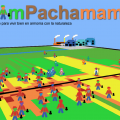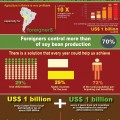 In continuation with the SimPachamama launch month at INESAD, this week has seen a number of articles published around the topics of gaming, deforestation and climate change:
In continuation with the SimPachamama launch month at INESAD, this week has seen a number of articles published around the topics of gaming, deforestation and climate change:
What would it cost to implement deforestation reduction policies in Bolivia?
By Ioulia Fenton
In conjunction with its partners, the Institute for Advanced Development Studies (INESAD) has designed statistical tools, using extensive real life data, to simulate what kinds of policies are likely to make a measurable impact on reducing deforestation while maximizing human wellbeing in Bolivia. As the “How to Live Well in Bolivia” infographic released by INESAD earlier this month illustrates, two policies working in tandem are predicted to have the best results. An internal US$450 tax on every hectare of cleared forest, structured in a way as to mainly affect large-scale commercial agriculture, could raise one billion dollars every four years and kick start deforestation reduction efforts. While laudable on its own, the policy would not be enough. A matching system of payments from rich countries to Bolivia for reducing deforestation that would raise an additional one billion dollars every two years is predicted to act as a catalyst. If the money is then spent on paying people to conserve their forests, on creating green jobs (such as within the eco-tourism sector), and financing anti-poverty initiatives, every year, together, the dual policy effort is forecast to engage 72 percent of the rural population, increase the income of the poor who participate by 29 percent, and achieve a 29 percent reduction in deforestation. (Play the SimPachamama simulation game to see if you can keep forests standing while making the community happy and wealthy). Read More »
 Development Roast Giving international development a proper roasting
Development Roast Giving international development a proper roasting
 On September 01, 2013, Americas Quarterly magazine published an article by INESAD’s Ioulia Fenton on whether or not games can influence development policy. Read the original article
On September 01, 2013, Americas Quarterly magazine published an article by INESAD’s Ioulia Fenton on whether or not games can influence development policy. Read the original article  Vivir Bien – living well – is a concept that has been prominent in Bolivian politics over the last few years. It sets out
Vivir Bien – living well – is a concept that has been prominent in Bolivian politics over the last few years. It sets out